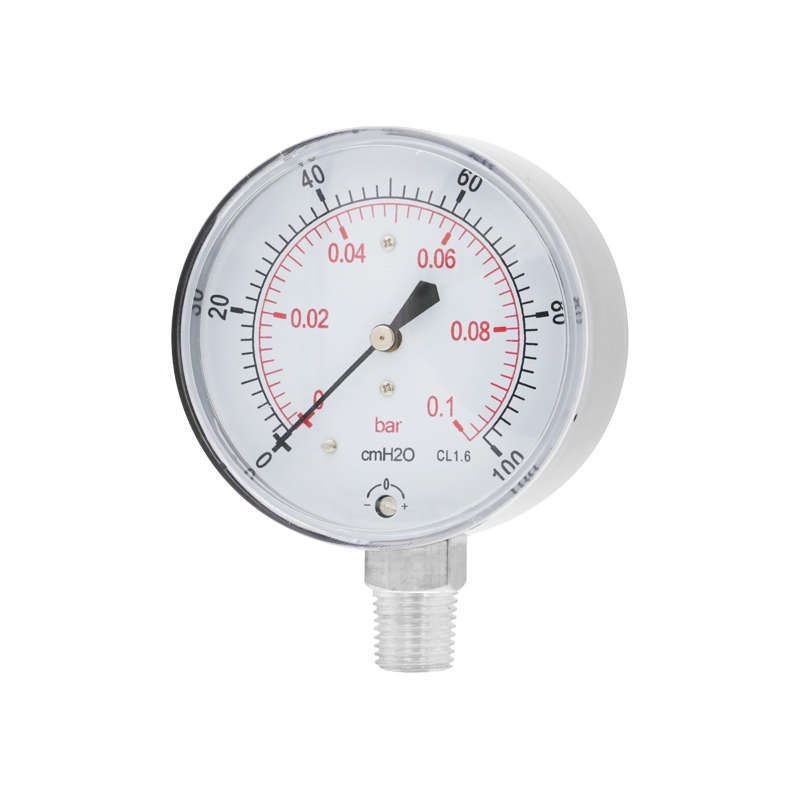
Sep . 14, 2024 15:32 Back to list
bellows differential pressure gauge company
Understanding Bellows Differential Pressure Gauges
In various industrial applications, the measurement of pressure is critical for ensuring safety and efficiency. One type of instrument that excels in this area is the bellows differential pressure gauge. This device is particularly valuable in environments where pressure differentials can provide significant insights into system performance.
What is a Bellows Differential Pressure Gauge?
A bellows differential pressure gauge is an instrument designed to measure the difference in pressure between two points within a system. The core component of this gauge is the bellows—a flexible, accordion-like structure made of metal or other materials that expand and contract in response to pressure changes. When pressure is applied, the bellows either expand or compress, and this mechanical movement is translated into a readable measurement on the gauge dial.
Working Principle
The working principle of a bellows differential pressure gauge is relatively straightforward. The device typically consists of two ports one connected to the high-pressure side and the other to the low-pressure side of a system. As pressure differentials arise, the bellows adjust in size accordingly. A spring or mechanical linkage attached to the bellows converts the movement into a rotational motion that turns the gauge needle, thereby indicating the pressure difference on a dial.
This mechanism allows for precise measurements of pressure differentials in a variety of applications, including HVAC systems, fluid dynamic processes, and even chemical manufacturing
.Advantages of Bellows Differential Pressure Gauges
bellows differential pressure gauge company

1. Accuracy One of the significant benefits of bellows gauges is their accuracy. The design permits precise measurement of small pressure differences, which is crucial in applications where slight variations can lead to system failures or inefficiencies.
2. Durability Made from robust materials, bellows gauges can withstand harsh environments, including extreme temperatures and corrosive substances. This durability translates into a longer lifespan and reduced maintenance costs.
3. Simplicity The mechanical design of bellows gauges means they do not require electronic components, reducing potential points of failure. This simplicity also makes them easy to install and operate.
4. Versatility These gauges can be utilized across various industries, including pharmaceuticals, food processing, and water treatment, making them a universal tool for engineers and technicians.
Applications
Bellows differential pressure gauges find applications in numerous fields. In HVAC systems, they monitor filters and ductwork to ensure that air flows correctly and efficiently. In chemical manufacturing, they help monitor reaction vessels, ensuring that pressure levels stay within safe limits. Additionally, in the oil and gas industry, these gauges are used to monitor pipelines and prevent leaks.
Conclusion
In summary, bellows differential pressure gauges serve as essential tools in monitoring and maintaining system integrity across various sectors. Their accuracy, durability, and simplicity make them a preferred choice for engineers and technicians who depend on reliable pressure measurements. As industries continue to advance, the role of such gauges in ensuring operational efficiency and safety will undoubtedly remain vital. Whether you're designing a new system or maintaining existing infrastructure, incorporating bellows differential pressure gauges can lead to improved outcomes and enhanced safety protocols.
-
High-Precision 5 Valve Manifold Differential Pressure Gauge Suppliers
NewsApr.29,2025
-
High-Precision Diaphragm Vacuum Pressure Gauges Manufacturers & Quotes
NewsApr.29,2025
-
Omega Differential Pressure Gauges High Accuracy & Durability
NewsApr.28,2025
-
Low Pressure Differential Pressure Gauges Precision Solutions & Quotes
NewsApr.28,2025
-
Digital Diaphragm Pressure Gaauge Precision Measurement & OEM Quotes
NewsApr.28,2025
-
Differential Pressure Gauge China Price High-Accuracy & Best Quotes
NewsApr.28,2025
